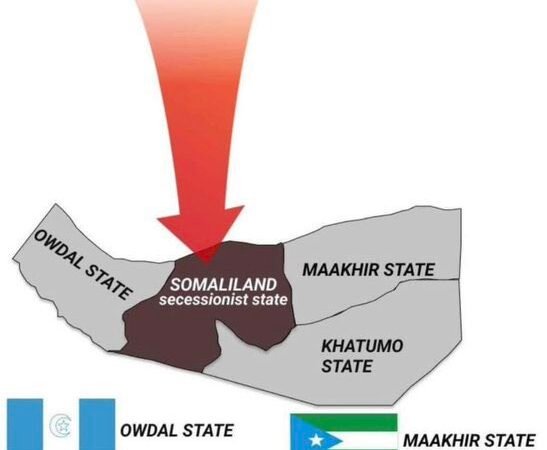The north of Somalia is a political and complex region, home to five big clans who have peacefully lived together with and without the current political and border disputes. But there exists a tiny separatist movement right in the middle of this region, which seeks to control the remaining part and get international acknowledgment as an independent state. This group has a limited territory, as evidenced by territorial claims and military control maps. If the United States chooses to recognize this single group while turning a blind eye to the rest of the region, it risks losing the support of the majority and inviting global powers such as China, Russia, and other powerful actors to set their foot in the region.
The Somali north is a place of significant economic and geopolitical value. It has over 15 strategically located seaports with notable access to the Gulf of Aden, Red Sea, and important maritime trade routes. The seaports are key nodes of international trade, maritime security, and regional trade. Stability and sound governance of this area are of fundamental concern to guarantee safe shipping routes, prevent piracy, and foster economic growth in the Horn of Africa.
Against these factors, any action by the U.S. to grant recognition to one separatist faction without regard to the overall regional dynamic threatens unintended consequences. This move would destabilize internal clan politics as well as erode Washington’s bargaining power in a region where competing global powers are actively seeking out strategic alliances.
In viewing a secessionist movement that does not represent all of northern Somalia, the U.S. would be ignoring the interests of most of the clans who oppose secession. This could encourage further internal conflict, dividing more communities that already struggle with government. The U.S. must take into account the potential that inter-clan disputes become mass violence and erode any chance of promoting stability and democratic rule in the area.
Great powers such as China and Russia have been expanding their presence in Africa by employing economic investment, security cooperation, and diplomatic outreach to establish strategic footholds. If the U.S. pushes away critical stakeholders in northern Somalia by promoting one group at the expense of others, it will be, in effect, giving China and Russia an opportunity to take up the space. These nations could bring economic advantages, security agreements, and infrastructure investment to much of the region, thereby diminishing the influence of the U.S. and altering the geopolitical landscape in favor of its rivals.
The separatist movement currently controls only part of the northern Somalia ports. If the U.S. chooses to recognize this movement and make alliances based solely on the land they occupy, it will be limiting its access to the broader maritime infrastructure in the region. To collaborate with the whole region, and not just one side, would be that the U.S. can access all the available port facilities, furthering its strategic and economic interests in the region.
Rather than taking a restrictive approach that is only about recognizing a separatist movement, the U.S. should adopt a more inclusive strategy of engaging all the key stakeholders in northern Somalia. The approach would involve the following:
The U.S. needs to set up direct diplomatic relations with the entire spectrum of major clans and political forces across northern Somalia. Through negotiations, the U.S. can fashion consensus-driven policies that improve local stability while taking care to involve everyone’s interest. Diplomacy also sidesteps turning away key players and lessens the danger of fueling animosity.
Economic investment is a powerful means of stabilizing war-torn regions. The U.S. will need to work with other nations to fund the development of infrastructure, build local business, and expand trade opportunities for the region as a whole. Economic development focuses the attention of the U.S. on offering incentives for cooperation between factions and not encouraging separatist movements.
Security ranks high in northern Somalia due to the extremist groups, piracy, and political instability. The U.S. ought to partner with regional authorities to enhance counterterrorism efforts, increase maritime security, and provide military training to enhance stability. With a security-centered approach that involves their engagement by all regional stakeholders, outside actors will be discouraged from exploiting internal fragmentation to serve their strategic interests.
Rather than indulging separatism, the U.S. can best serve to encourage a style of government wherein all the northern Somalia clans and factions are included. Implementing a decentralized pattern of government allowing autonomy while holding national unity is an option that could work best. This would allow different groups to rule themselves without leading to further fragmentation of Somalia.
It would be a strategic error for the U.S. to identify a single northern Somali separatist movement in isolation of the broader regional context. This approach would alienate the majority of the population, invite foreign powers like China and Russia to expand their influence and limit U.S. access to key maritime infrastructure. Instead, a more pragmatic approach involving all stakeholders, promoting economic growth, enhancing security cooperation and backing inclusive governance is needed to attain long-term stability.
America must provide the highest priority to a policy that meets both its strategic interests and that of the Somali people of northern Somalia. Thus, it can remain relevant in the region, prevent the rise of geopolitical rivals, and contribute to achieving lasting peace and development. If not, it will be a costly gamble with the potential to lose the trust of the broader Somali people while handing key regional power to alternative world powers.
Recognizing a Single Faction in Somalia? A Geopolitical Mistake for the U.S.



